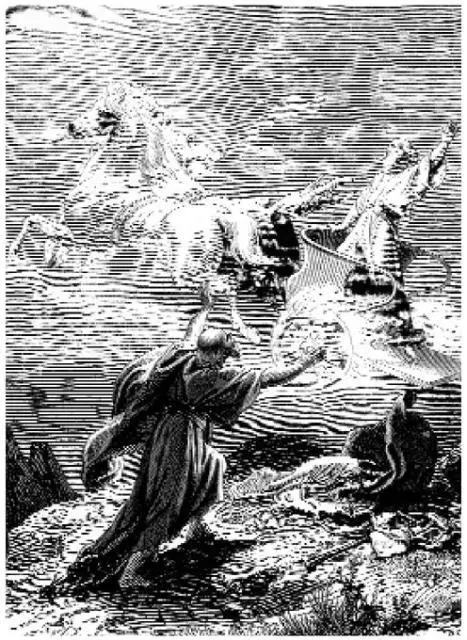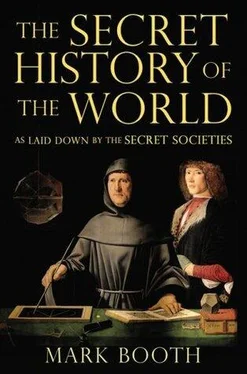Elijah developed this gift to the next stage. He learned how to excarnate and incarnate at will.
You can’t take it with you, goes the popular saying, but according to the secret doctrine you can. The great twentieth-century initiate G.I. Gurdjieff said that exactly what is needed truly to become master of oneself in this life is what is needed to survive as a conscious being in the afterlife. Initiation is concerned at least as much with life after death as this life. In the seventh book of The Republic Plato said, ‘Those who are unable in the present life to apprehend the idea of the good, will descend to Hades after death and fall asleep in its dark abode.’
At the end of his life Elijah was carried up into the heavens in a fiery chariot. So like Enoch and Noah before him, he did not die in the ordinary way. He joined the college of ascended masters, who are for the most part invisible but return to earth at times of great change and crisis.
In cabalistic thought the chariot by means of which Elijah ascends is called the Merkabah. Great initiates are able to work on the vegetable body so that it does not dissolve after death, enabling the ascending spirit to keep aspects of consciousness only usually possible during life on earth. Initiates know of secret techniques by means of which very fine energies may be crystallized in such a way that they are not dispersed.
We will see later that Christian thinkers would call this chariot the Resurrection body. As Elijah ascended his mantle slipped from him to be taken up by Elisha, whom Elijah had chosen as his successor. By some mysterious process the confering of the mantle gives Elisha an increased portion of Elijah’s power. (We will return to look at the way this works when we come to consider the life and work of Shakespeare.)
The succession of Elijah by Elisha was not without ambiguity, though. Once Elijah seemed as if he might want to repudiate Elisha. He hurried off and, when Elisha caught up with him, said, ‘Go back. What have I done to you?’ Does he see something in Elisha he is not sure of? Later Elisha is mocked for being bald by a large gang of boys and uses his power to call two bears from the woods which attack and kill them. It is as if the prophet is still engaged in a deadly battle with Baal.
Two hundred years later, by the time of the later prophets, a new, transcendent understanding of the way the universe works had developed. The concept of Grace put prophets on a much less warlike footing. In 550 BC Isaiah proclaimed, ‘The people that walked in darkness have seen a great light… For unto us a child is born, unto us a son is given: and the government shall be on his shoulder: and his name shall be called Wonderful, Counsellor, the Mighty God, the Everlasting Father, the Prince of Peace.’

Elijah ascends. Print from a nineteenth-century Bible.
The concept of Grace grew out of this prophetic sense of history. The kings of the two kingdoms and their peoples failed to do what was asked of them. They degenerated and the land was laid waste. But then, because of the Grace of God, a living root emerged from the wasteland. The prophets saw Grace operating in this way in their own lifetimes on a military and political level, in the rise and fall and rise again of their own little kingdoms. They also prophesied its repetition in the greater cosmic cycles of history.
For the followers of Baal, on the other hand, life was about the exercise of power. They believed that if they performed the correct religious practices — sacrifices and magical ceremonies — they could compel their gods to do their bidding.
Isaiah repudiated this view. He told his people that Yahweh had shown them Grace by choosing them, by empowering them to obey, by purging them of their sins, by saving them when they had been stiff-necked and disobeyed, and by the promise of restoring them to former glory even though they did not deserve it. Yahweh’s gracious love could never be demanded, bought or earned, he said. It is a love given in complete freedom.
Once this kind of divine love had been understood, it would only be a matter of time before this understanding opened a new dimension in the love of one human for another.
Isaiah had a great sense of both the history and the future fortunes of Israel — ‘there shall come forth a rod out of the stem of Jesse’. He also has a great vision of the end of history which we will return to later — ‘the wolf and the lamb shall feed together, and the leopard shall lie down with the kid’.
The prophetic tradition would die out by about 450 BC. As the Cabalist Rabbi Hayyim Vital would write, at the end of the sixteenth century, after Haggai, Zechariah and Malachi, prophets were only able to see into the lowest levels of the heavens and then only in a heavily shrouded way.
The last words in the Old Testament are the ringing words of Malachi, prophesying Elijah’s return, and today this is still looked forward to every year at Passover, when a place is laid for him at dinner, with a cup of wine and the door left open.
BUT IN DIFFERENT PARTS OF THE WORLD other remarkable initiates were opening up other new dimensions in the human condition. A great spirit of enlightenment was weaving through several different minds and several different cultures at the same time.
Prince Siddhartha was born into a time and place characterized by small warring states in Lumbini in modern-day Nepal.
Until the age of twenty-nine he lived in pampered luxury. His every need was met before it began to tug on him and his every vista was a delight. Then one day he left the royal palace and saw something he had never been allowed to see — an old man. He was horrified, but he looked further, discovering that his own people were ill and dying.
He decided to leave the palace — and his wife and child — in order to try to make sense of this suffering. Living among ascetics for seven years, he failed to find what he was looking for in the yoga sutras of Pantanjali and the teachings of the descendants of the Rishis.
Then, finally, when he was thirty-five he went and sat under a Bohdi tree on the banks of the River Neranjara, determined not to move until he understood.
After three days and three nights he realized that life is suffering, that suffering is caused by desire for earthly things, but that you can achieve freedom from all desire. Indeed, you can achieve such freedom, and such affinity for the spirit world, that you need never reincarnate again — and so you may become, as Siddhartha did, a Buddha.
The path to understanding — or enlightenment — was called by the Buddha ‘the Eightfold Path’, which involved right belief, right conviction, teaching, action, living, intention, thinking, contemplation.
The Eightfold Path may seem impossibly high-minded moralizing to modern Western sensibility. It may also seem a bit abstract, even impractical. But the teachings of the Buddha have an esoteric side, and like all esoteric teachings they have a layer of meaning which is eminently practical. Esoteric philosophy teaches its initiates how to achieve psychological transformation using practical techniques to manipulate human physiology. In the case of the Buddha’s Eightfold Path, these eight practices are exercises for enlivening eight of the sixteen petals of the throat chakra.
This represents a historic change in initiatic practice. In the initiation rituals practiced in the Great Pyramid, for example, the candidate had been sent into a deep, death-like trance, then a circle of — five — initiates had raised his vegetable body out of his physical body. They had worked on it, moulding it, coaxing it into forms capable of perceiving higher worlds, so that when the vegetable body sank again into the physical body and the candidate reawoke, he was born into a new, higher form of life. The point is that the candidate was unconscious throughout this process.
Читать дальше













